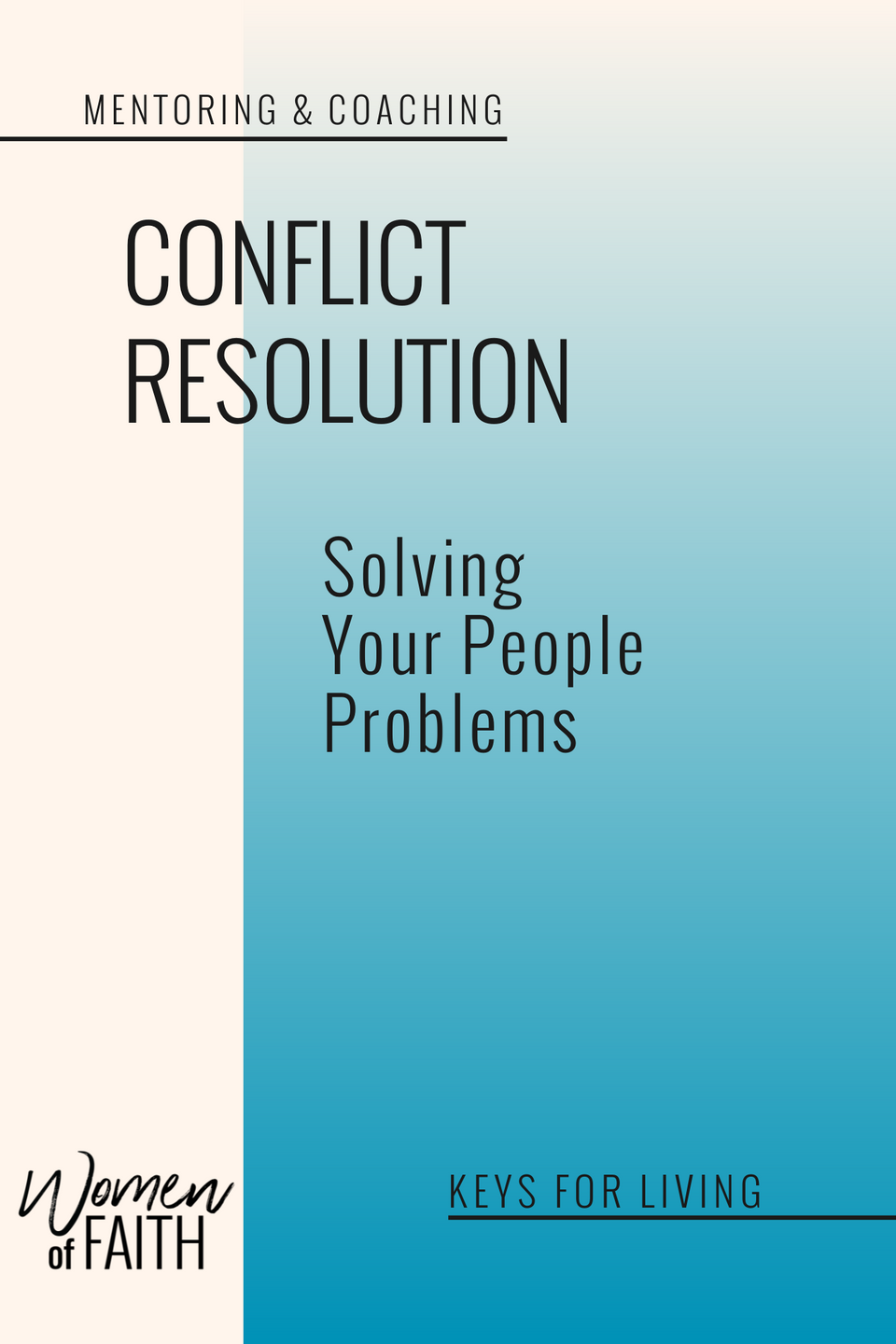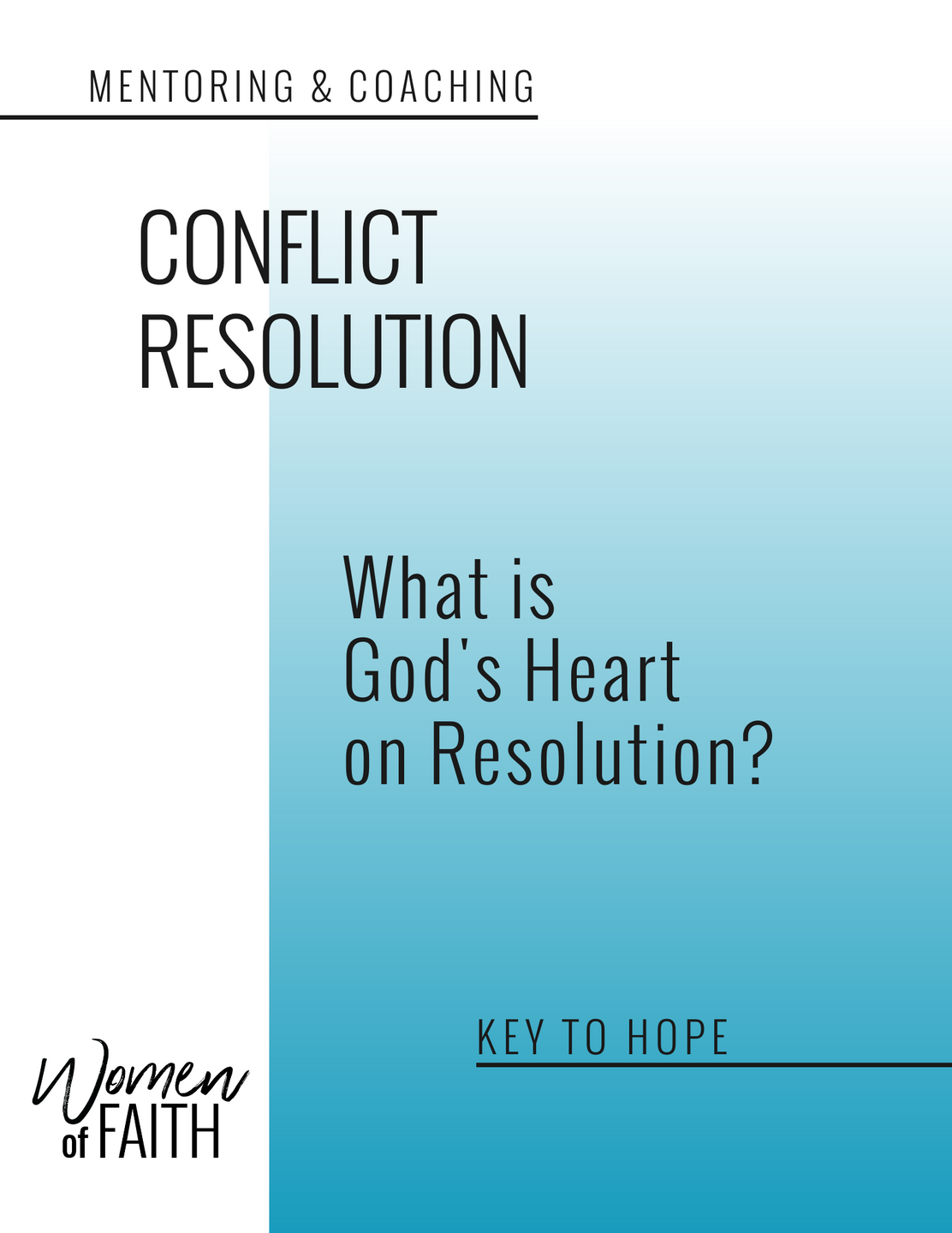CONFLICT RESOLUTION

E-BOOK
Ready to start reading right now?
Download now for a complete and comprehensive reading on CONFLICT RESOLUTION.
KEYS FOR LIVING BOOKS
The Women of Faith Keys for Living books are designed for those looking for help and for those looking to help others. The Keys are great for personal study and growth, small group studies, and for teaching and training purposes.
What to Expect in the Keys: You’ll discover God’s wisdom and guidance in a simple format.
- Definitions help you understand the topic from God’s perspective.
- Characteristics give insight into the different aspects of the topic.
- Causes shed light on the underlying issues related to the topic.
- Steps to Solution (Step-by Step) show you how to be transformed, walk in freedom and live in victory.
“Let us therefore make every effort to do what leads to peace and to mutual edification.”
Romans 14:19
Conflict is unavoidable and it doesn’t have to be unbearable. God promises that we’ll clash, but He’s also shown us how to find resolution. Maybe you’ve always seen the Bible as a rule book. Look again.
In your mind, does the word conflict spell t-r-o-u-b-l-e? Disharmony in the home, wars in the workplace, disputes in the church—each situation should lead us to the One to whom we turn for direction, strength, and courage, but does it always? These Keys for Living will help you come to understand the differences between resolution and reconciliation, and come to believe that resolution rests in confronting the wrong . . . with the right heart. Learn to identify who creates conflict and who keeps it going, as well as the what, why, and how of boundaries in conflict resolution.
The reason we all experience conflict is rooted in a system of wrong beliefs. We assume that what we want is what we need and it’s up to us to defeat those who oppose us. After all, if we don’t protect our own interests, who will?
We may feel that our significance is being threatened so we attack. We may feel our security is threatened so we avoid. This fear-based thinking causes us to respond selfishly because we make the situation about us.
BIBLICAL VERSES ON CONFLICT RESOLUTION
In the story of Esther, she makes a request for her people to be spared from annihilation by the crafty snake, Haman. Not only does the king grant her request, but in his rage he has Haman hanged on the very gallows Haman had built for Mordecai. Haman is indeed elevated, but not in the way he expected! Instead of remaining in power to see the destruction of the Jewish people, Haman had a from grace with the king.
After a time of great conflict, true resolution resonates throughout the land for the Jewish people. If Esther had avoided the conflict (retracting from trouble like a turtle), she would not be recognized today as a national heroine and choice servant of God. Instead, she confronted the conflict and rose to the occasion “ for such a time as this” (Esther 4:14). The Bible says . . .
“There is a time for everything . . . a time to be silent and a time to speak.”
Ecclesiastes 3:1, 7
COLLECTION OF CLASSES
Take a deep dive into complete and comprehensive teaching.
Learn with our collection of classes found by subscribing today PLUS receive so much more.
Our Women of Faith Collection of Classes are designed to help you and those you care about deepen your relationship with Jesus and make practical changes in your life. Sign up to watch the Women of Faith Collection of Classes at LIFTABLEtv and start moving toward the FREEDOM you crave.
Whatever you’re facing, your life matters, and God wants you to live in victory. Today is a great day to begin.
Check out our class on Conflict Resolution.
Practical Tools and Resources to Go Deeper!
SPIRITUAL STRENGTH | LIFE LEADERSHIP | REAL RELATIONSHIPS

NOT SURE ON HOW TO START?
LEARN: WHAT IS GOD'S HEART ON RESOLUTION?
Get your free Key to Hope on CONFLICT RESOLUTION. The download will be sent to your email.
WOMEN OF FAITH SHOW with ALITA REYNOLDS
Inspiring conversations that will encourage you to live the life you were created for.
Do you want to experience a deeper relationship with Jesus?
Do you need some encouragement that your story has a purpose?
Join Alita Reynolds, the President of Women of Faith, as she and her featured guests inspire you to live the life you were created for and equip you to walk more fully in God’s purpose for your life.
Whatever your story, your life matters, you belong, and God wants you to live victoriously. You’ll meet a wide range of guests who impact the kingdom in meaningful ways every day. Their stories will inspire you to believe that when we walk by faith, ANYTHING is possible.
What Is a Conflict
Conflicts are disagreements, struggles, or battles over opposing issues or principles.
Resolution vs. Reconciliation
Resolution and reconciliation are different. ...
- Resolution means finding the answer or analyzing a complex notion into simpler ideas.
- Reconciliation means 100% restoration to harmony ... to bring together again.
Some differences may never be resolved, but you can still be reconciled to those with whom you differ. At other times, resolution of differences may be possible, but reconciliation may be inappropriate, such as in the case of adultery or cult entrapment. God requires only that, as far as it is possible, you seek to be at peace with everyone. ...
“Make every effort to live in peace with everyone and to be holy; without holiness no one will see the Lord.”
(Hebrews 12:14)
Different Types of Conflict
- Intrapersonal Conflict: A struggle within a person to decide between two or more choices. (Esther 4:11)
- Interpersonal Conflict: A clash of ideas or interests between two or more people. (Esther 3:5)
- Intraorganizational Conflict: A competitive or opposing action within a group (a family, department, church, political party, state, or nation). (Esther 7:7)
- Interorganizational Conflict: A battle or opposing action between two or more groups (families, companies, religions, or countries). (Esther 3:13)
Aggressive Attackers and Passive Avoiders
3 Aggressive Attackers
- Wolves: Known to be “wolves in sheep’s clothing,” they cloak their harmful intentions behind a harmless facade. They are known to be forward, direct, and zealous in the seduction of women. (Ezekiel 22:27)
- Snakes/Serpents/Vipers: Known to be dangerous and treacherous, injecting injurious venom into people or groups by poisoning their minds, hearts, or reputation. They are known to act silently, secretly, and slanderously to inflict injury on others. (Psalm 140:3)
- Hornets: Known to be excessively angry or “mad as a hornet,” they gather others to “swarm” a person or place, thus creating havoc or harm with “stings” (for example, accusations, threats, attacks, etc.). (Joshua 24:12)
3 Passive Avoiders
- Tortoises: Known for being slow or for being stragglers, they tend to “withdraw into a shell” when threatened. They are also known for dawdling or shirking responsibility. (Leviticus 11:29)
- Chameleons: Known to change their minds or even their character, but only superficially ... merely to be expedient, or to “fit in.” They blend in with diverse groups by reflecting each group’s look, behavior, and belief when with the group. (Leviticus 11:29–30)
- Weasels: Known to act deviously, unscrupulously, and underhandedly, they use “weasel words” in order to be evasive or insincere. They will often evade or escape from a situation by “weaseling out” of it. (Leviticus 11:29)
Attackers and Avoiders
8 Faulty Accusations of Attackers
- “You’ll never change.”
- “You challenge me, and I’ll pin you to the wall.”
- “You don’t have what it takes to succeed in this life.”
- “You’re so stupid that you don’t have enough sense to get out of the rain.”
- “You failed again—you’re just a failure.”
- “You’re at fault if our relationship fails.”
- “You can’t even do the simplest things correctly.”
- “You’re hopeless—there’s no hope for you.”
Instead of focusing on the faults of others (out of pride), the Bible tells us to bear the burdens of others (out of humility). (Galatians 6:2–3)
8 Faulty Expectations of Avoiders
- “You should never create conflict in our relationship.”
- “You should never get angry with me because I can’t handle it.”
- “You should always see things my way if you care about my feelings.”
- “You should always do things my way if you care about my happiness.”
- “You should always trust my judgment if you respect me.”
- “You should always depend on me to make you secure.”
- “You should always overlook my mistakes if you truly accept me.”
- “You should always seek to meet my needs if you want us to have a good relationship.”
However, the Bible says we should look to the Lord as our Need- Meeter. (Philippians 4:19)
Who, What, Why, Where, When and How
Before attempting to resolve a conflict, first answer the following six questions, five of which start with a W and one with an H.
Who?
Who is involved in the conflict? Name those presently involved in the conflict. List those who could be involved to bring about a resolution.
What?
What is your goal? Put into writing what you want to accomplish. Be clear. Is this a onetime goal or a long-term goal?
Why?
Why do you want to do it? List the reasons for taking action. List what will happen if you do not take action.
Where?
Where will it happen? Assess a place where you think the conflict could possibly be resolved. Evaluate whether there is another suitable location where resolution could occur.
When?
When do you want it finished? Establish a timeline from beginning to end. List short-term, measurable goals.
How?
How do you want it to be done? List the policies and procedures that need to be put in place. List the guidelines needed to accomplish the goal.
“The heart of the discerning acquires knowledge, for the ears of the wise seek it out.”
(Proverbs 18:15)
The story of Esther teaches . . .
Only after becoming queen was Esther able to save the Jewish nation.
Esther 4:14 —“For if you remain silent at this time, relief and deliverance for the Jews will arise from another place, but you and your father’s family will perish. And who knows but that you have come to your royal position for such a time as this?”
“We know that in all things God works for the good of those who love him, who have been called according to his purpose.”
Romans 8:2
-
Conflicts can be used to accomplish God’s purpose.
- Conflicts cannot always be avoided.
Esther and the Jewish people could not escape Haman’s threats. Esther 4:13 —“He sent back this answer: ‘Do not think that because you are in the king’s house you alone of all the Jews will escape.’”
“I have told you these things, so that in me you may have peace. In this world you will have trouble. But take heart! I have overcome the world” John 16:33.
- Conflicts that are resolved require advance preparation and planning.
At Esther’s direction, the Jews fasted before she planned to willingly go before the king on behalf of the Jews.
Esther 4:16 —“Go, gather together all the Jews who are in Susa, and fast for me. Do not eat or drink for three days, night or day. I and my attendants will fast as you do. When this is done, I will go to the king, even though it is against the law. And if I perish, I perish.”
“The plans of the diligent lead to profit as surely as haste leads to poverty” Proverbs 21:5.
- Conflicts are not necessarily bad—they can actually sharpen us if we respond correctly.
Handled well, they provide an opportunity for role modeling.
For centuries, Esther has been and continues to be a role model of how to make an appeal to a higher authority.
Esther 5:7–8 —“Esther replied, ‘My petition and my request is this: If the king regards me with favor and if it pleases the king to grant my petition and fulfill my request, let the king and Haman come tomorrow to the banquet I will prepare for them. Then I will answer the king’s question.’”
“Blessed is the one who perseveres under trial because, having stood the test, that person will receive the crown of life that the Lord has promised to those who love him” James 1:12.
- Conflicts can sometimes be settled through negotiation.
-
Esther graciously negotiated with the king. Esther 7:3–4 — “Then Queen Esther answered, ‘If I have found favor with you, Your Majesty, and if it pleases you, grant me my life—this is my petition. And spare my people—this is my request. For I and my people have been sold to be destroyed, killed and annihilated. If we had merely been sold as male and female slaves, I would have kept quiet, because no such distress would justify disturbing the king."
”“Listen to advice and accept discipline, and at the end you will be counted among the wise” Proverbs 19:20.
- Conflicts that are resolved require action toward peace.
-
Due to Esther’s intervention with the king, he took action that allowed the Jews to assemble and to defend themselves.
Esther 8:11 — “The king’s edict granted the Jews in every city the right to assemble and protect themselves; to destroy, kill and annihilate the armed men of any nationality or province who might attack them and their women and children, and to plunder the property of their enemies.”
“Let us therefore make every effort to do what leads to peace and to mutual edification” Romans 14:19.
The Road to Resolution
As I prepare to walk the road to resolution of a conflict, I will remember to...
- Pledge my commitment. (Romans 12:18)
- Pray for the two of us. (“Lord, please show us the true issue. Reveal any personal errors we need to face. Prepare both my heart and the heart of [ name ] to be open.”) (Psalm 139:23–24)
- Prepare before I ask for a meeting. (Lamentations 3:40)
- Propose a time to talk face-to-face. (Ephesians 4:3)
- Provide a private place away from people and distractions. (Matthew 18:15)
- Purpose to be honest. (Proverbs 12:17)
- Permit total forgiveness. (Colossians 3:13–14)
- Perceive a future harvest. (Galatians 6:9)
- Present the present conflict. (1 Corinthians 13:5)
- Promote fairness and objectivity. (Leviticus 19:15)
- Protect your privacy. Don’t involve outsiders. (Proverbs 11:13)
- Preserve individuality. Don’t demand “like-thinking.” (Job 32:17)
- Project openness and optimism. (1 Thessalonians 5:11)
- Practice love. (Proverbs 17:17)
“I appeal to you ... that all of you agree with one another.”
(1 Corinthians 1:10)
How to Respond When Others Are Critical of You
- Be discerning regarding the accuracy of the critical words of others. (Proverbs 16:21)
- Be open to the slightest kernel of truth when you are criticized. (Proverbs 17:10)
- Be willing to consider the criticism. If it is true, this person is God’s megaphone to get your attention. (Proverbs 12:15)
- Be able to receive criticism without being defensive. Admit to any truth in the criticism—agreeing when you are in error and then asking for further correction. (Proverbs 15:12)
- Be determined to speak well of your critic. (Romans 12:14)
- Be dependent on the Lord’s perspective, not on the opinion of others, to determine your worth and value. (Galatians 1:10)
“Do not be overcome by evil, but overcome evil with good.”
(Romans 12:21)
How to Turn Foes into Friends
- Find ways to compliment your opposer. (Psalm 37:30)
- Repay your opposer’s evil with good. (Romans 12:17)
- Intercede in prayer for your opposer. (1 Samuel 12:23)
- Empathize with your opposer. (1 Peter 3:8)
- Nurture a forgiving heart toward your opposer. (Mark 11:25)
- Decide to love your opposer. (Romans 13:8)
- Seek to meet the needs of your opposer. (Romans 12:20)
Key Verse to Learn
“Let us therefore make every effort to do what leads to peace and to mutual edification.”
(Romans 14:19)
Key Passage to Read
Book of Philemon verses 1–25
LIVE IN VICTORY!
100+ BIBLICALLY BASED RESOURCE TOPICS
READY TO GO DEEPER?
Be coached and equipped to boost your spiritual strength, experience real relationships, and be the life leader you are.
Want to learn more about our other 100+ topics? Check out the Women of Faith Resources, to discover biblical hope and practical help on these topics. The Women of Faith Resources are designed to help you – and help you help others – overcome difficulties, grow in maturity, and move forward in life.
God desires to give you hope as you face life challenges, problems and difficult trials. The good news for us, God specializes in redemption and transformation. He takes that which was lost and restores it. He takes that which was dead and gives it life. He takes that which had no hope and rewrites its story. This is our God! As you pray today, ask God boldly to transform the thing inside you that you want to see changed forever!
Thank you for your interest and support in Women of Faith. We pray God will encourage, equip, and empower you with His life-changing truth.



